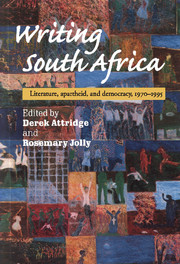Book contents
- Frontmatter
- Contents
- Contributors
- Acknowledgements and note on references
- South Africa, 1930–1996: a chronology
- Maps
- 1 Introduction
- 2 Interrogating silence: new possibilities faced by South African literature
- 3 I am dead: you cannot read: André Brink's On the Contrary
- 4 Endings and new beginning: South African fiction in transition
- 5 The post-apartheid sublime: rediscovering the extraordinary
- 6 Postmodernism and black writing in South Africa
- 7 Shame and identity: the case of the coloured in South Africa
- 8 A man's world: South African gay writing and the State of Emergency
- 9 The final safari: on nature, myth, and the literature of the Emergency
- 10 Interview
- 11 Speech and silence in the fictions of J.M.Coetzee
- 12 ‘Dialogue’ and ‘fulfilment’ in J.M. Coetzee's Age of Iron
- 13 Interview
- 14 Inside out: Jeremy Cronin's lyrical politics
- 15 Spinning out the present: narrative, gender, and the politics of South African theatre
- 16 South African theatre in the United States: the allure of the familiar and of the exotic
- Position papers
- Select bibliography: South African literary writing in English, 1970–1995
- Index
14 - Inside out: Jeremy Cronin's lyrical politics
Published online by Cambridge University Press: 05 July 2011
- Frontmatter
- Contents
- Contributors
- Acknowledgements and note on references
- South Africa, 1930–1996: a chronology
- Maps
- 1 Introduction
- 2 Interrogating silence: new possibilities faced by South African literature
- 3 I am dead: you cannot read: André Brink's On the Contrary
- 4 Endings and new beginning: South African fiction in transition
- 5 The post-apartheid sublime: rediscovering the extraordinary
- 6 Postmodernism and black writing in South Africa
- 7 Shame and identity: the case of the coloured in South Africa
- 8 A man's world: South African gay writing and the State of Emergency
- 9 The final safari: on nature, myth, and the literature of the Emergency
- 10 Interview
- 11 Speech and silence in the fictions of J.M.Coetzee
- 12 ‘Dialogue’ and ‘fulfilment’ in J.M. Coetzee's Age of Iron
- 13 Interview
- 14 Inside out: Jeremy Cronin's lyrical politics
- 15 Spinning out the present: narrative, gender, and the politics of South African theatre
- 16 South African theatre in the United States: the allure of the familiar and of the exotic
- Position papers
- Select bibliography: South African literary writing in English, 1970–1995
- Index
Summary
Jeremy Cronin's poems collected in the single and singular volume Inside, the interviews he has granted in conjunction with the publication of this volume, and his critical essays on literary culture, mostly concerned with ideological configurations in black South African poetry of the 1970s, all in one way or another address the relation between public and private, rearticulating a tension common to recent South African literatures: the disparity, perhaps only an ostensible disparity, of demands for revolutionary struggle on the one hand and aspirations for a more private aesthetic on the other. Amid the poems in Inside, I shall argue, Cronin commonly achieves a surprisingly secure viewpoint for ideological critique. And no small part of the surprise in which this viewpoint is secured is that it should be secured here, inside a volume of poetry, rather than ‘outside’; rather, that is to say, than in the critical essays where Cronin directly addresses the issue of ideology, or rather than in what for him must be the political domain of that public performance for which some of the poems are expressly composed. Cronin's ideological critique, I shall further argue, derives its security from a less predictable event than the ruin of hegemonic order that the order and ordering of his poems frequently seek; the force of his critique will instead be linked in the end to the collapse of order in which these poems themselves come to participate.
- Type
- Chapter
- Information
- Writing South AfricaLiterature, Apartheid, and Democracy, 1970–1995, pp. 187 - 203Publisher: Cambridge University PressPrint publication year: 1998
- 1
- Cited by

